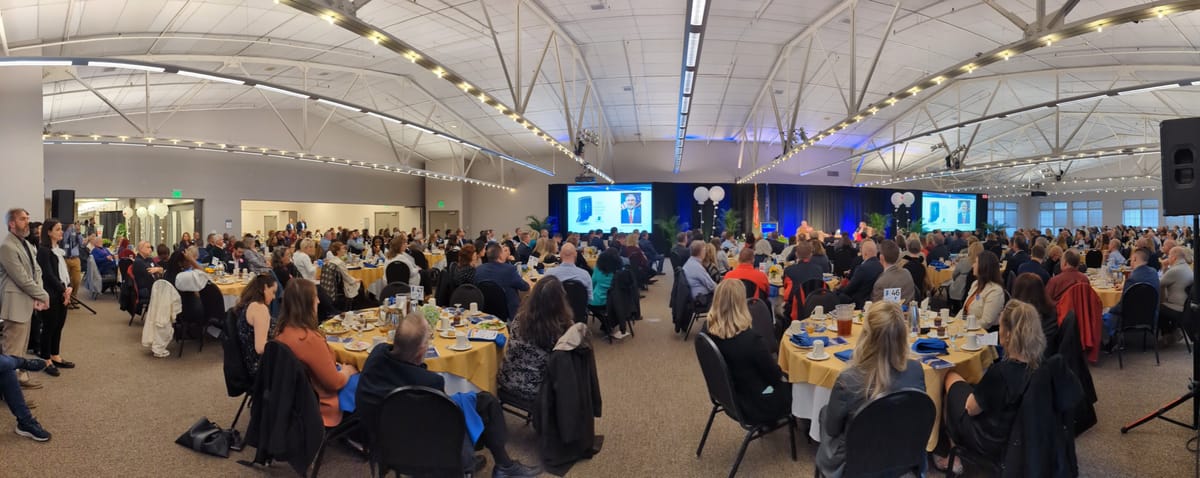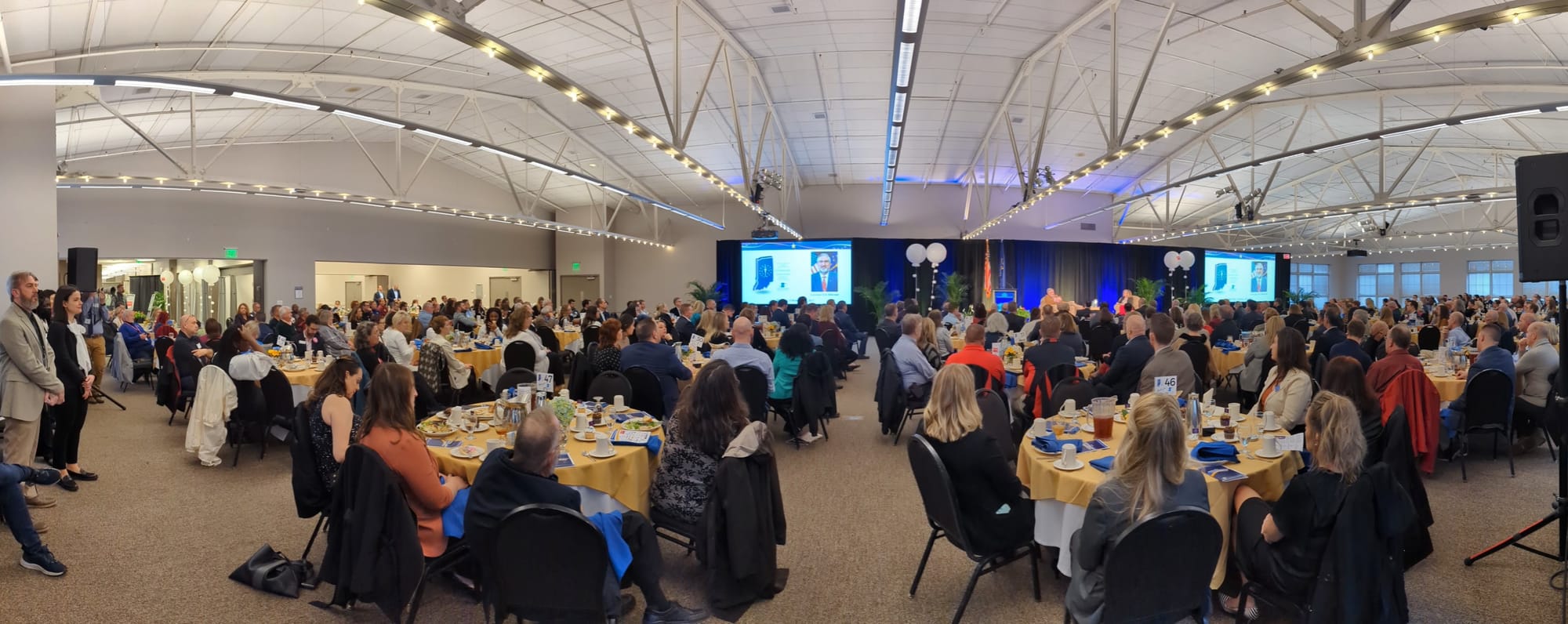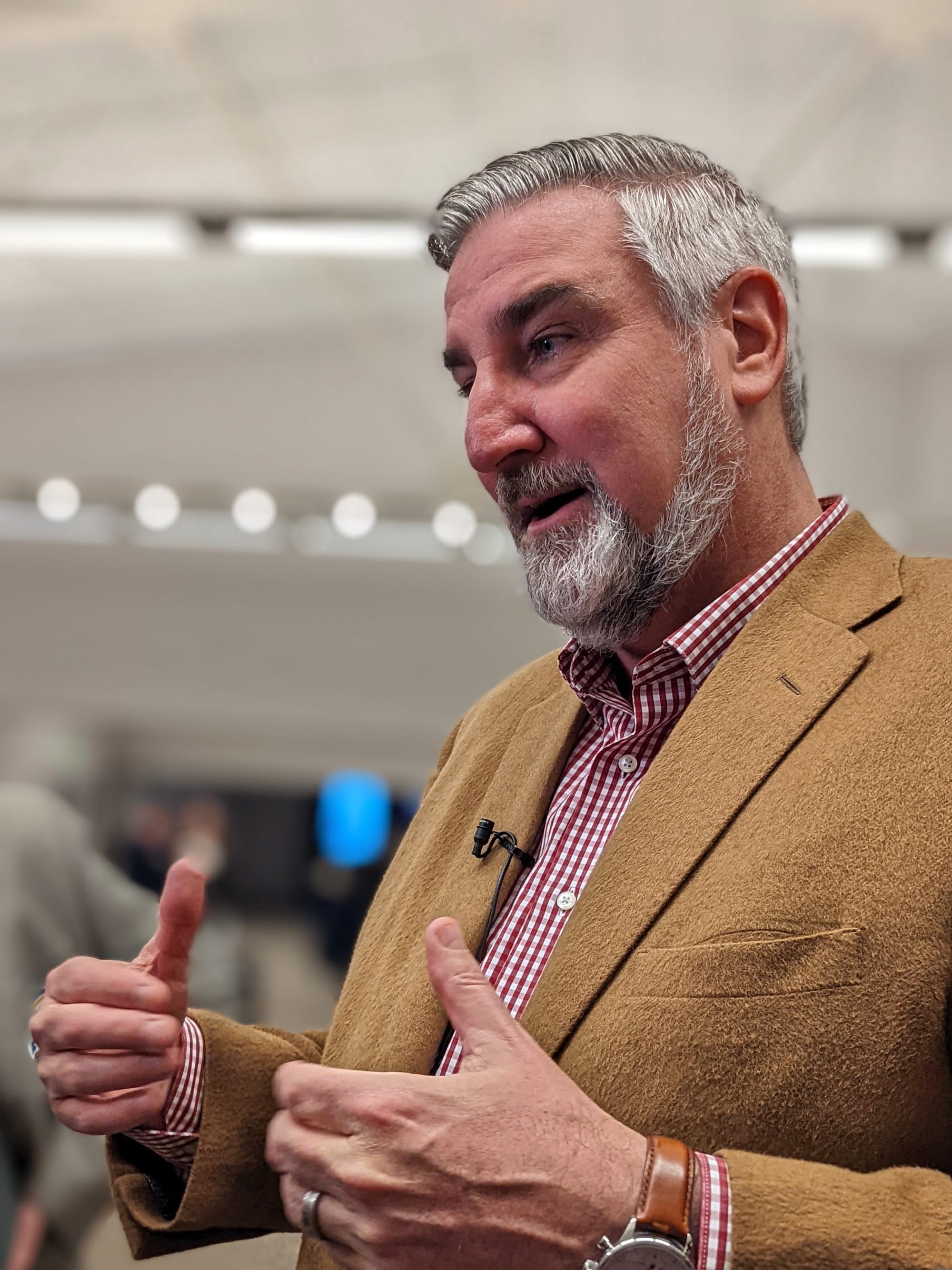Holcomb on SB4, a bill to boost local health support: “It gets funded, because of one word: commitment.”



On Thursday, Indiana governor Eric Holcomb was in town to headline a Greater Bloomington Chamber of Commerce event at the Monroe Convention Center.
During the Q&A, Holcomb was asked about a report that was delivered by the governor’s public health commission in August 2022.
“What surprised you from that report?”
The question came from Indiana University president Pam Whitten, who served up topics to Holcomb as the two sat in easy chairs in front of an audience of around 450 people.
Holcomb said he’d wished he’d appointed his special health commission to do its work sooner than he did—namely, before the COVID-19 pandemic. He added the conventional wisdom about hindsight—it’s 20/20.
As for anything unexpected in the report, Holcomb said he was “pleasantly surprised” that the report did more than merely acknowledge that something needs to be done.
The specific recommendations in the report include establishing baseline service standards for all local health departments, and providing support to local health departments to provide those services.
On Thursday, Holcomb said, “We haven’t done enough on the state level, to partner with the local leaders who are administrating, delivering those core public health services.”
In front of the legislature this session is SB4, which is a bill that incorporates many of the recommendations from the governor’s health commission’s report. On Friday, the day after Holcomb’s Bloomington visit, SB4 got a 14–0 do-pass recommendation from the senate’s committee on appropriations.
SB4 defines certain core health services and gives county commissioners a way to apply for additional funding each year, in order to provide those core public health services. The additional funding comes with certain reporting requirements.
After the chamber event, The B Square asked Holcomb what assurance he could give that the kind of increased expenditures to support local health departments, which are called for in SB4, will actually get funded.
Holcomb’s answer: “Well, it gets funded because of one word: commitment.” He continued, “We have the financial wherewithal to afford the plan that we have put forward.” That includes just over $100 million that would go to locals in the first year, and around $200 million in the second year, Holcomb said.
It’s the legislature that appropriates the money. Hocolm said, “We will execute the dollars that we are given to assist and partner with local communities.”
Holcomb stressed that the wording would be very clear—that local health departments have a choice about participating in the enhanced funding program. “It will be an opt in,” he said. But he added, “I would say the folks that choose to opt out, it is at their own peril.”
The question to Holcomb about a commitment to funding SB4 stemmed from remarks by state senator Shelli Yoder the previous Saturday at a League of Women Voters legislative update. Yoder was responding to a question about the perception that the bill is just a platform for the state to wrest control of local health departments.
Yoder has been added as a co-author of the SB4, so she doesn’t see it as problematic in terms of taking away authority from the locals.
Her main concern is not that amendments could be added that transform SB4 into something that coerces health departments into participation in the new program and imposes state control.
Her worry is about the adequacy of funding. Last Saturday she put it like this: “What has me concerned is: Will there be funding?” She continued, “The whole purpose of [SB4] is to get funding to address public health concerns in counties across Indiana.”
Yoder talked about the fear by some that SB4 could lead to punishment of counties, with a reduction in funding, for failing to participate in the program. Yoder attributed much of that fear to a basic distrust of government.
Possibly fueling that distrust were some comments made at the June 30, 2022 meeting of the governor’s public health commission. Striking a nerve with some observers were remarks by one commissioner who said about local health departments that wanted to operate autonomously, without participating in the state program, “We need to lovingly support them in their misdirection.”
Another remark at the same meeting has caused concern about the possibility an amended SB4 could make participation by locals in the new state program a requirement. While the governor’s commission was not recommending a “mandate,” one commissioner stated, “The legislature could do that.“
The video of the June 30, 2022 meeting got some discussion by public commenters at last week’s (Feb. 9) meeting of Monroe County’s health board.
Addressing the board of health was Bloomington resident Andrea Ford, who characterized the governor’s health commissioners at the June 30, 2022 meeting as “actively talking about coercing counties into opting into this new restructuring that they’re coming up with.”
Ford continued, “It is very clear that they want every county in this—which is centralized public health.” She called centralizing public health throughout the state a “very scary matter.”
Included in SB4 are some new provisions for the appointment of local boards of health. Currently, all board of health members are appointed by the county commissioners. SB4 would have the effect of giving one appointment to the Monroe County council and one to the mayor of Bloomington.
It’s not clear if the city of Bloomington’s policy approach during the COVID-19 pandemic would have been different, if there had been one mayoral appointment to the county board of health.
On the question of permissible gathering sizes during the pandemic, Bloomington mayor Hamilton issued an executive order setting the maximum size at a number that was smaller than the limit set by the county board of health.




Comments ()